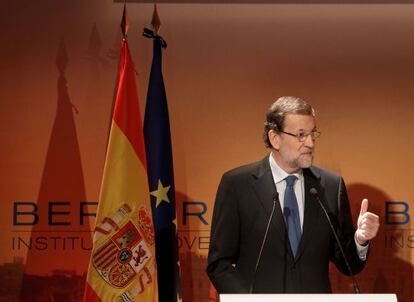Rajoy: “The forces of euroskepticism are lying in wait to destroy the project”
Prime Minister closes series of forums on Europe’s future in Madrid Socialist leader Rubalcaba laments “mistakes” made in handling financial crisis

Prime Minister Mariano Rajoy on Friday brought to a close a series of conferences on the future of Europe organized by the Berggruen Institute on Governance by issuing a rallying cry for pro-European sentiment. “There are those who are fueling disregard toward Europe in a worrying and unjust manner,” Rajoy told an audience that included former Italian Prime Ministers Enrico Letta and Mario Monti, and current Portuguese Prime Minister Pedro Passos Coelho.
“There is a disturbing crisis of confidence, while although a minority, is growing every day. We have to be ready to guarantee the free movement of people, which is a fundamental pillar,” Rajoy continued. “We must all defend it with conviction. These [May] elections are a challenge for Europeanism. It is my desire that there be a greater increase of forces that believe in European integration. The forces of euroskepticism are lying in wait to destroy the project from within because they are incapable of building an alternative.”
Rajoy also spoke of the need to formulate a common policy on immigration, a flash point in the Spanish exclaves of Ceuta and Melilla in recent weeks. “We need a European Union without internal frontiers. We are not in the process of turning Europe into a fortress. Immigration should be an option, not an obligation. But is must be made clear that undocumented migrants are not entering Spain or Italy, they are entering Europe.”
Turning to domestic affairs, Rajoy proclaimed Spain “to be in better shape than a year ago,” and stated that the destruction of jobs had “been stopped.” “But we cannot and must not content ourselves. It is in our hands to assure our young people that the crisis is only a parenthesis in a history of growth.”
“There are those who are fueling disregard toward Europe in a worrying and unjust manner,” Rajoy says
“Europe is our home, Europe is our place. Europe has a present and a future. Together we can achieve many things in a growing and global world,” the prime minister concluded.
Earlier in the day opposition Socialist Party leader Alfredo Pérez Rubalcaba attended a cross-party forum of political leaders including the European commissioner for the internal market and cervices and vice president of the European People’s Party (EPP) Michel Barnier; former Belgian Prime Minister and leader of the Group of the Alliance of Liberals and Democrats for Europe, Guy Verhofstadt; Monica Frassoni, co-president of the European Green Party, and Íñigo Méndez de Vigo, the Spanish secretary of state for the European Union.
“We did something wrong if a crisis that at the outset was American and financial became a European one,” said Rubalcaba. “What would have happened if [president of the European Central Bank Mario] Draghi had made his famous speech earlier? What would have happened if we had slowed the pace of austerity measures? We have made mistakes and these have fomented populisms. What should we now do in the face of this challenge? The way to confront it is by recovering the essence of the European project; peace, democracy, development and wellbeing (…). There is a lack of a political program to recover these values.”
Verhofstadt, a candidate for the presidency of the European Union this year, went further: “The crisis has been very badly managed. In the US the crisis is over. In China and India there isn’t one. Nor in Japan. Only in Europe. The reason is we lack political, fiscal and banking union. We have talking about it for six years and it still hasn’t been done. The populists maintain that the solution is to return to the national ambit. This for me makes no sense as we are already facing global challenges.”
Tu suscripción se está usando en otro dispositivo
¿Quieres añadir otro usuario a tu suscripción?
Si continúas leyendo en este dispositivo, no se podrá leer en el otro.
FlechaTu suscripción se está usando en otro dispositivo y solo puedes acceder a EL PAÍS desde un dispositivo a la vez.
Si quieres compartir tu cuenta, cambia tu suscripción a la modalidad Premium, así podrás añadir otro usuario. Cada uno accederá con su propia cuenta de email, lo que os permitirá personalizar vuestra experiencia en EL PAÍS.
¿Tienes una suscripción de empresa? Accede aquí para contratar más cuentas.
En el caso de no saber quién está usando tu cuenta, te recomendamos cambiar tu contraseña aquí.
Si decides continuar compartiendo tu cuenta, este mensaje se mostrará en tu dispositivo y en el de la otra persona que está usando tu cuenta de forma indefinida, afectando a tu experiencia de lectura. Puedes consultar aquí los términos y condiciones de la suscripción digital.









































